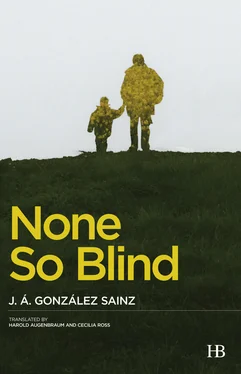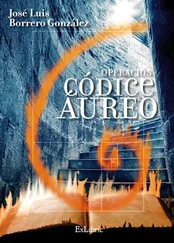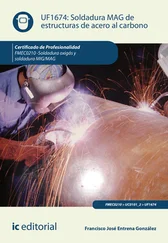“You just don’t get it, Felipe,” they said to him again as they watched him stare unblinkingly at the photo of his wife on the page of a newspaper he now bought himself. “You know it, but you don’t want to admit it.”
He had unwrapped his sandwich, slowly smoothed out the paper, moving the palm of his hand across the photo, which he didn’t take his eyes off even for a moment, and it was as if that simple act of passing his hand back and forth over the wrinkled surface of the newspaper were the only thing that could allow him to stand looking at it, by presenting it to him intermittently, in brief flashes, just like the headlights of the cars and trucks passing him as he walked at night along the shoulder of the highway.
So that’s it, he said to himself upon arriving home that day a bit after nightfall, that’s it. In her smile in the photograph, which he hadn’t managed to decipher at first, a strangely veiled smile, a smile someone who had known her a long time might call an artificial smile, small-town , that was the term that sprang to mind, though he didn’t know why, a small-town smile, you could see the impassable distance that separated them and had been growing at the same pace and to the same proportions as that smile that had been forming on her face. It wasn’t her smile, that was the first thing that occurred to him, or rather it wasn’t the smile of the person he had first met, instead it seemed more like his son’s smile the last time they could be said to have spoken to one another, when he’d actually said my son, do you understand, my son ? Her smile also revealed, more than anything else, more than thankfulness or satisfaction at having gotten the post, and much more, especially, than any real happiness or joy, which were completely absent, something else — rivalry, hostility, and in the end repulsion, a grimace of concentrated, defiant repulsion and an air of self-satisfied, vindictive stubbornness identical to his son’s expression the last time he’d called him my son and spoken to him as one speaks to a son. Juanjo , he sounded out each syllable as he walked along the shoulder of the highway, past the immense, windowless hangar next to which he could never figure out why he felt so vulnerable and alienated. Juan José, my son, Juan José .
If the syllables of a person’s name could contain some meaning and weren’t just expanding pockets or metallic hollowness, that nocturnal utterance of his would surely encompass it all. Are emotions, he put it to himself, what give meaning to names? Or love, even when thwarted or unrequited? Or is it just desperation?
The cars blinded him for a moment as they passed; it was drizzling again, and in the brief interval of time in which their headlights lit up the road in front of him, he could see the water falling almost half-heartedly. Although it was gradually soaking him, he liked to see the raindrops for the instant they hung there; they filled with light, and the dark background against which they shone seemed, just then, less dark, less able to attract and absorb everything, to swallow it all up. He went on watching them as he walked — when he came to a puddle on the shoulder, he would quicken his pace, so that any cars driving close to the curb wouldn’t splash him — and then suddenly he had the urge to see the laughing eyes and warm, calm expression of the woman he had fallen in love with almost forty years ago. He remembered what both of them always said had been the happiest day of their lives together, the day they were dead set on insisting, despite the dates not adding up right, that they’d conceived their first child.
It was a dry, Sunday afternoon, and the heat felt as if it couldn’t be any more oppressive, and the sky, so clear you could almost reach out and touch it, as if it were something solid, nevertheless made you feel as though it were softly embracing everything in its care. Under the poplars, in the field, lying on the grass in the shelter of elders and danewort, everything was good, so good they could never remember it having ever been as good before or since. The leaves on the trees, swaying in the intermittent breeze, created a play of tremors of light and flashes of shadow on the pristine nakedness of her body, like sequins on the exigent mystery of her pubis and the manifest fullness of her breasts. For a moment he thought — or perhaps it was now that he was thinking it — that it was uncertain whether the light was coming from on high, from the clear flesh of the sky, or from below, from the smooth sun of her body. Above and below, just like matter and spirit, din and silence, were dimensions no longer counterposed; they became superposed, like their bodies and the fluids and the breath emanating from their bodies. In a place of no sound, you could hear the whispering of the foliage, the twittering of birds, the disquieting exactitude of water flowing in the river right nearby, and the deep breathing — her soft moaning — each time he, with a tranquility that seem to emerge from the very earth on which they were lying, penetrated her as if he had done no other thing in life, nor believed he ever would, than enter her.
He was aware at the time, or rather now, that there were doubtless many ways to say what he was doing and many words with which to say it — I’m fucking her, for example, or I’m laying her, I’m boning her, giving it to her, or I’m screwing her brains out, he could have put it, or perhaps he expressed it the way his friends always expressed it — but it seemed to him that none of those even came close to what was happening there and that, just the opposite, they were creating an unfillable space between what was going on there and how to express it, between what they were doing, or, rather, what was happening, and what was done or what happened by naming it, a gulf that, for all the words or ways of expressing it he might try, continued growing wider rather than narrower.
You can’t know, he said to himself, you can’t know what is really being said when you say it. He understood gratitude and tenderness when he picked a piece of fruit or observed the slowness of growth in a plant or the blossoming of a bud; he understood skill when he grafted one branch onto another or composed a sentence at the printshop, when he released a spring, when he wielded a tool; he knew about violence from digging and about vigor from grabbing a lump of earth and breaking it into pieces, and he knew, too, about exhaustion and satisfaction, but all that — tenderness and violence, vigor and fatigue, skill and satisfaction — was just one part of that which was nevertheless much more than all of it put together. A body that calls out to another body, a body that is no longer a body, however, because of its being so much something else, and tenderness that is no longer tenderness, because of its being so much body and flesh, secreted fluids and oozing pores, licking tongues and sucking lips and also blood and nerves and mud with no need for anything to resort to words that might come later, just like the Egyptian vultures or the great, bearded vultures adhering to their agreement.
He fell asleep with his hand in the mud of the irrigation ditch that ran at the foot of the elders, and embracing her again after he awoke, he accidentally smeared her side and cheek with muck. She laughed — or perhaps the foliage, the river, and the birdsong laughed — with a calm, gentle peal that gave him the feeling he could see through the world for just an instant, and the world was good and cheerful and it reached everything and everywhere. Without knowing what moved him to it, motivated, perhaps, by the incitement of this unveiling, he went on slowly slathering her entire body with mud, and when he had finished, he stretched out on the ground to rest, thinking that everything was finished and, therefore, everything could now begin.
Читать дальше












